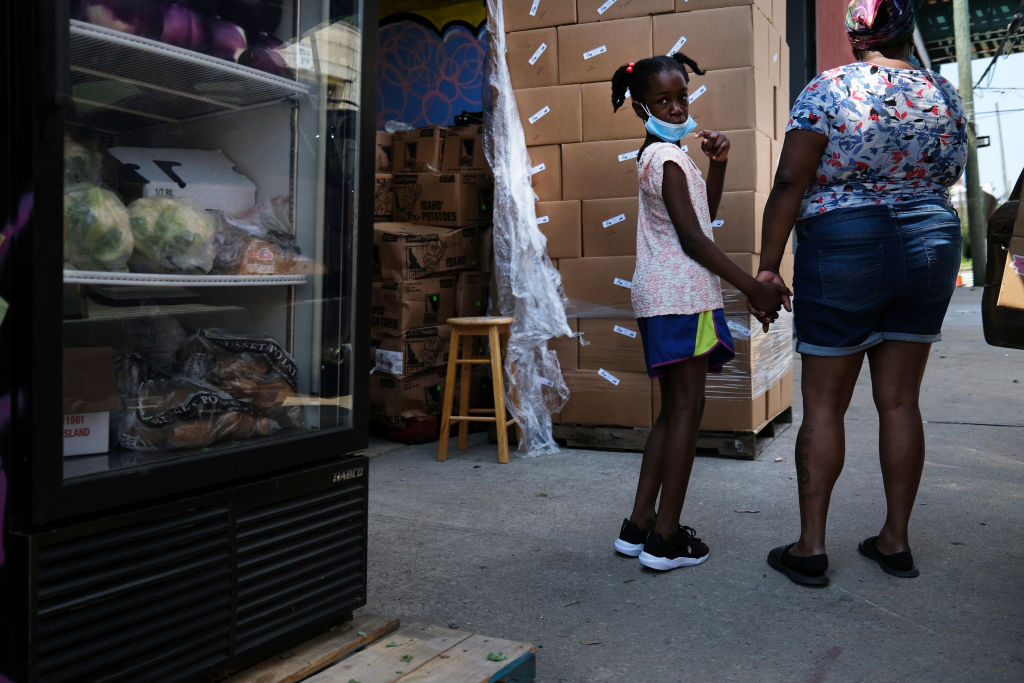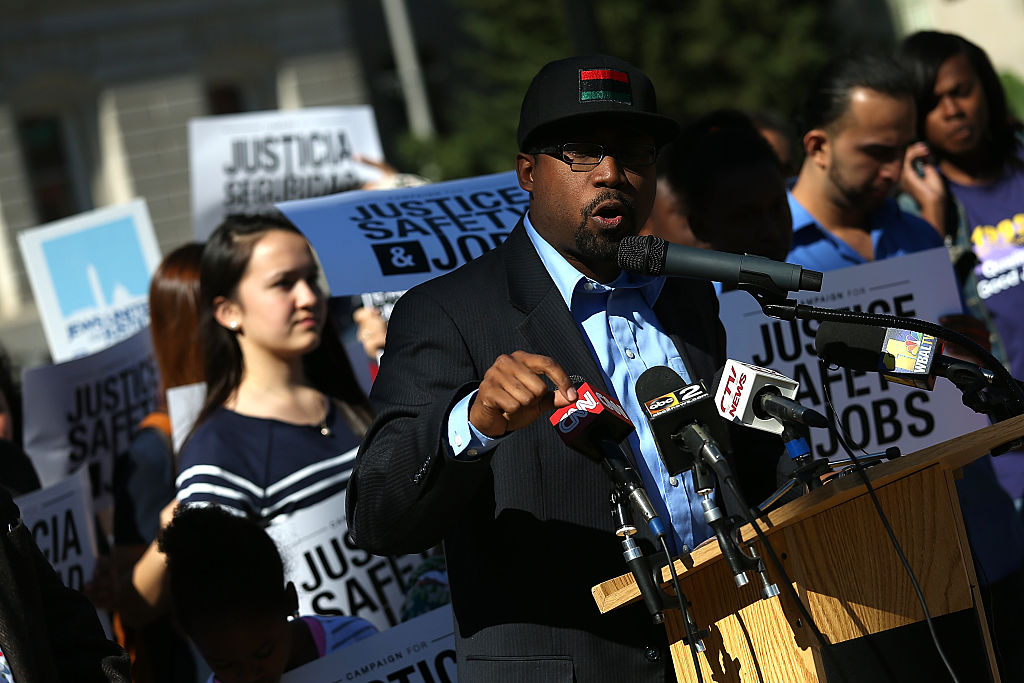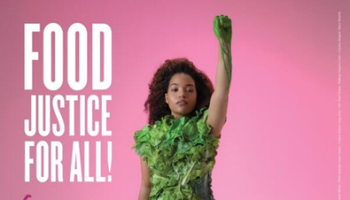Food Sovereignty And Black Communities: Building Power, Agency
How Food Is A Runway To Build Power And Agency In Black Communities

A mother and daughter wait for assistance at Universe City, a decentralized food hub in the Brownsville neighborhood that is working to build food sovereignty while also promoting community healing practices on July 22, 2020, in the Brooklyn borough of New York City. | Source: Spencer Platt / Getty
When many people think about building power in Black communities, they often think of voting rights and civic engagement. While important, these items are one component of a broader framework to build power in Black communities. An oft-overlooked component is food sovereignty.
Food sovereignty extends beyond charity and addresses the power and racial dynamics of food apartheid, or racialized access to food. Food sovereignty leads to food justice. But for generations, Black communities have been denied sovereignty over their local food environment via redlining, zoning laws, divestment, under-investment in Black-owned businesses and more. Consequently, in communities across the country, Black people lack access to, and agency over, healthy food options.
MORE: The Thing About Food Insecurity In Our Communities
Our community has been offered charity but charity-centered models for addressing food insecurity are deficient and will always come up lacking. Unless you are talking about power as well as charity, we aren’t interested in hungry people not being hungry anymore, or hungry people being able to do for themselves. Unfortunately, too many times, when attempting to explain health disparities, leaders tend to blame the Black community rather than the institutions and practices that undermined food sovereignty in the first place.
That is why I founded the Black Church Food Security Network (BCFSN). When I launched BCFSN in 2015, I wanted to boost the Black community’s ability to grow, sell and source food, and do so via the collective Black church. I also wanted to increase our community’s support of Black farmers. Black farmers have experienced generations of injustice. Many administrations have presented themselves as trying to give resources and attention to the injustices experienced by Black farmers, but those political attempts are limited at best. Like many people, I knew that there needed to be a comprehensive solution to address the plight of Black farmers, and food justice.
BCFSN launched with one congregation – Pleasant Hope Baptist Church in Baltimore – and today has over 250 member congregations in urban and rural communities across the country. The growth of this program makes sense. We are providing healthier food options, engaging a broader segment of the community and building the economies of local communities. And we are doing this with assets already in Black communities. As the largest institution in the Black community, the Black church is replete with offerings. From the physical grounds, to classrooms, kitchens, to church vans and buses, to the land, to the people, the Black church can fill multiple needs in communities hampered by food apartheid.
The Black church was also where the issue of food sovereignty crystallized for me.

Pleasant Hope Baptist Church Pastor Heber Brown speaks during a rally and news conference held by the Campaign for Justice, Safety and Jobs at War Memorial Plaza on October 16, 2015, in Baltimore, Maryland. | Source: Win McNamee / Getty
While pastoring the Pleasant Hope Baptist Church, I noticed a pattern of hospitalizations related to diet and related issues. Determined to change health outcomes, I started a garden in the front yard of the church. Doing so transformed the quality of life for members and changed the fabric and nature of the church’s ministry. While the BCFSN began with encouraging churches to start gardens on church premises, the program grew to include establishing orchards, encouraging congregations to make institutional bulk purchases from Black farmers, host farmers markets (preferably on Sundays after worship), and arranging tours of local Black farms.
In addition to supporting our community in achieving optimal health, we are also reaching younger generations who long to see ministry in action. For instance, post the COVID-19 pandemic, the fastest religious identity in this nation is those who claim no religion at all. The spiritual appetite is still there – but it’s not tied as tightly to Sunday morning church attendance. Parishioners – particularly younger ones – want to see their congregation or faith community invested and involved in the issues that color their existence. It is not enough to preach about the good news on Sundays; we must be the good news on Monday, and every day of the week.
Our ancestors saw food as a runway to build power and agency. People like Mrs. Fannie Lou Hamer, Rev. Albert B. Cleage, Jr. and Rev. Vernon Johns saw the importance of building power and agency through Black farming. They understood then, as we understand today, that Black America will stay sick and tired if we rely solely on food charity. The BCFSN has simply picked up where our Ancestors left off and hopes to cultivate an even greater harvest that nourishes us while building power in our community.
Rev. Dr. Heber Brown, III is the founder and executive director of the Black Church Food Security Network. (www.BlackChurchPower.com)
SEE ALSO:
Here Are Some Ways You Can Help With America’s Growing Hunger Crisis
Founder Of Houston’s First Black-Owned Grocery Store Strives To Address City’s Food Deserts
















